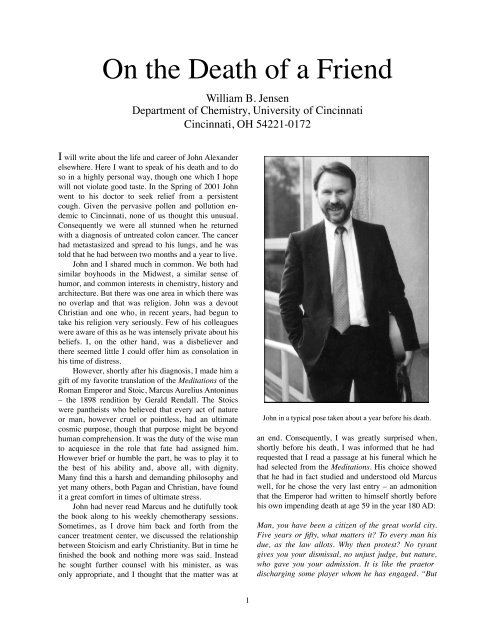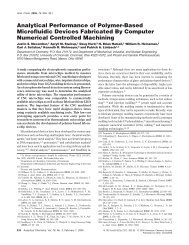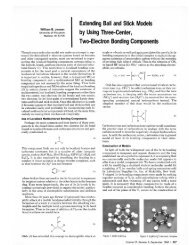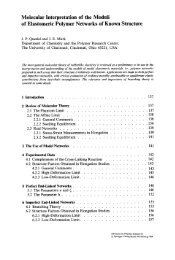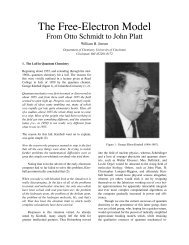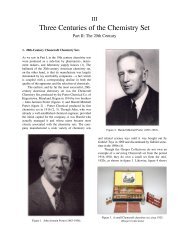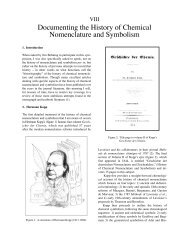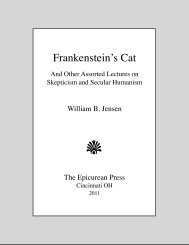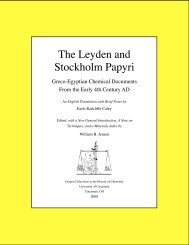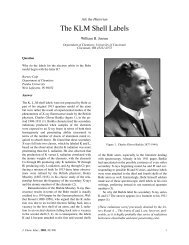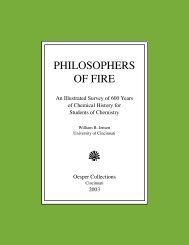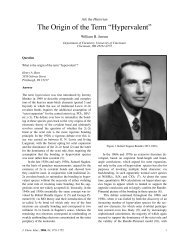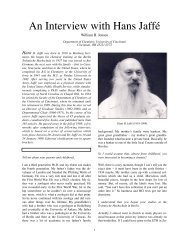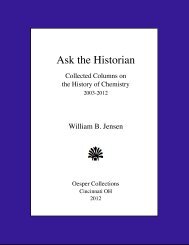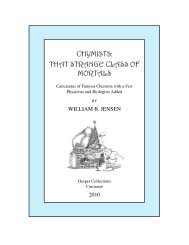099 John Alexander .pdf - University of Cincinnati
099 John Alexander .pdf - University of Cincinnati
099 John Alexander .pdf - University of Cincinnati
You also want an ePaper? Increase the reach of your titles
YUMPU automatically turns print PDFs into web optimized ePapers that Google loves.
On the Death <strong>of</strong> a Friend<br />
William B. Jensen<br />
Department <strong>of</strong> Chemistry, <strong>University</strong> <strong>of</strong> <strong>Cincinnati</strong><br />
<strong>Cincinnati</strong>, OH 54221-0172<br />
I will write about the life and career <strong>of</strong> <strong>John</strong> <strong>Alexander</strong><br />
elsewhere. Here I want to speak <strong>of</strong> his death and to do<br />
so in a highly personal way, though one which I hope<br />
will not violate good taste. In the Spring <strong>of</strong> 2001 <strong>John</strong><br />
went to his doctor to seek relief from a persistent<br />
cough. Given the pervasive pollen and pollution endemic<br />
to <strong>Cincinnati</strong>, none <strong>of</strong> us thought this unusual.<br />
Consequently we were all stunned when he returned<br />
with a diagnosis <strong>of</strong> untreated colon cancer. The cancer<br />
had metastasized and spread to his lungs, and he was<br />
told that he had between two months and a year to live.<br />
<strong>John</strong> and I shared much in common. We both had<br />
similar boyhoods in the Midwest, a similar sense <strong>of</strong><br />
humor, and common interests in chemistry, history and<br />
architecture. But there was one area in which there was<br />
no overlap and that was religion. <strong>John</strong> was a devout<br />
Christian and one who, in recent years, had begun to<br />
take his religion very seriously. Few <strong>of</strong> his colleagues<br />
were aware <strong>of</strong> this as he was intensely private about his<br />
beliefs. I, on the other hand, was a disbeliever and<br />
there seemed little I could <strong>of</strong>fer him as consolation in<br />
his time <strong>of</strong> distress.<br />
However, shortly after his diagnosis, I made him a<br />
gift <strong>of</strong> my favorite translation <strong>of</strong> the Meditations <strong>of</strong> the<br />
Roman Emperor and Stoic, Marcus Aurelius Antoninus<br />
– the 1898 rendition by Gerald Rendall. The Stoics<br />
were pantheists who believed that every act <strong>of</strong> nature<br />
or man, however cruel or pointless, had an ultimate<br />
cosmic purpose, though that purpose might be beyond<br />
human comprehension. It was the duty <strong>of</strong> the wise man<br />
to acquiesce in the role that fate had assigned him.<br />
However brief or humble the part, he was to play it to<br />
the best <strong>of</strong> his ability and, above all, with dignity.<br />
Many find this a harsh and demanding philosophy and<br />
yet many others, both Pagan and Christian, have found<br />
it a great comfort in times <strong>of</strong> ultimate stress.<br />
<strong>John</strong> had never read Marcus and he dutifully took<br />
the book along to his weekly chemotherapy sessions.<br />
Sometimes, as I drove him back and forth from the<br />
cancer treatment center, we discussed the relationship<br />
between Stoicism and early Christianity. But in time he<br />
finished the book and nothing more was said. Instead<br />
he sought further counsel with his minister, as was<br />
only appropriate, and I thought that the matter was at<br />
<strong>John</strong> in a typical pose taken about a year before his death.<br />
an end. Consequently, I was greatly surprised when,<br />
shortly before his death, I was informed that he had<br />
requested that I read a passage at his funeral which he<br />
had selected from the Meditations. His choice showed<br />
that he had in fact studied and understood old Marcus<br />
well, for he chose the very last entry – an admonition<br />
that the Emperor had written to himself shortly before<br />
his own impending death at age 59 in the year 180 AD:<br />
Man, you have been a citizen <strong>of</strong> the great world city.<br />
Five years or fifty, what matters it To every man his<br />
due, as the law allots. Why then protest No tyrant<br />
gives you your dismissal, no unjust judge, but nature,<br />
who gave you your admission. It is like the praetor<br />
discharging some player whom he has engaged. “But<br />
1
WILLIAM B. JENSEN<br />
the five acts are not complete; I have played but three.”<br />
Good – life’s drama, look you then, is complete in<br />
three. The completeness is in his hands, who first<br />
authorized your composition, and now your dissolution.<br />
Neither was your work. Serenely take your leave;<br />
serene as he who gives you the discharge.<br />
The Stoicism <strong>of</strong> Marcus formed in some way a<br />
fragile bridge between <strong>John</strong>’s Christianity, on the one<br />
hand, and my own Epicureanism on the other. Like<br />
Epicureanism, it denied the existence <strong>of</strong> a personal<br />
God, but, like Christianity, it affirmed some ultimate<br />
purpose in life and nature. Epicureanism, though also<br />
teaching the acceptance <strong>of</strong> death as a natural process,<br />
repudiated the existence <strong>of</strong> any such inherent purpose<br />
in the mindless concourse <strong>of</strong> atoms and void. This was<br />
surely too harsh a doctrine to discuss with <strong>John</strong> at such<br />
a time, and indeed it would never have entered my<br />
mind to do so. But though a man may refrain from the<br />
gaucherie <strong>of</strong> pushing his beliefs on another, he can<br />
almost never refrain from judging the actions <strong>of</strong> another<br />
through the lens <strong>of</strong> those beliefs. And in observing<br />
<strong>John</strong> during the last year <strong>of</strong> his life, I was struck by<br />
how much better his behavior conformed, albeit unconsciously,<br />
to my personal philosophy than did my<br />
own.<br />
According to Epicurus, the most valuable possession<br />
a man could attain, aside from the virtue <strong>of</strong> prudence,<br />
was friendship:<br />
Of the things that wisdom prepares for insuring lifelong<br />
happiness, by far the greatest is the possession <strong>of</strong><br />
friends ... The noble man is chiefly concerned with wisdom<br />
and friendship, <strong>of</strong> these the former is a mortal<br />
good, the latter an immortal one ... Friendship dances<br />
through the world bidding us all to awaken to the recognition<br />
<strong>of</strong> happiness.<br />
That <strong>John</strong> unknowingly followed this injunction was<br />
apparent from the number <strong>of</strong> visitors that crowded his<br />
hospital room and home during the last weeks <strong>of</strong> his<br />
life and by the many people who prepared meals and<br />
helped with <strong>John</strong>’s physical care. I once said to him<br />
that one <strong>of</strong> our differences lay in the fact that, while I<br />
had invested my life in books, he had invested his in<br />
friends.<br />
Since Epicureans did not believe in a life after<br />
death, they tended to emphasize the importance <strong>of</strong><br />
maximizing the quality <strong>of</strong> the present rather than postponing<br />
happiness in the hope <strong>of</strong> attaining some imaginary<br />
future reward. It is a thought best captured in the<br />
well-known phrase <strong>of</strong> the Roman poet, Horace – carpe<br />
diem – “seize the day.” This <strong>John</strong> also did. When he<br />
received the news <strong>of</strong> his ultimate fate, he did not sink<br />
into a lethargic depression, but did in fact attempt to<br />
seize what days remained to him by spending as many<br />
as possible with his family and current friends, and by<br />
traveling to New York, Michigan and Chicago to visit<br />
old friends, some dating back to his high school and<br />
college days. He even talked about making a trip to<br />
Greece in order to view first hand the ultimate sources<br />
<strong>of</strong> Western Civilization.<br />
Always a lover <strong>of</strong> cats, <strong>John</strong> also acquired a coalblack<br />
kitten during his final year. He named it Harold<br />
and took great pleasure in observing its endless antics.<br />
The manic, almost undirected energy <strong>of</strong> this young<br />
creature, so near the beginning <strong>of</strong> its life, seemed to<br />
cheer him even as his own life and energies were approaching<br />
an end. This cat was, ironically, the last<br />
thing that <strong>John</strong> and I talked about in a conversation that<br />
took place two days before his death. I had come upon<br />
a comic limerick about a cat that reminded me <strong>of</strong> Harold<br />
and which I knew would amuse <strong>John</strong>, but it had<br />
repeatedly slipped my mind during his period in the<br />
hospital and after his return home. In the meantime,<br />
Harold had been banished to a relative's house since<br />
his increasingly frantic frolics, coupled with the large<br />
number <strong>of</strong> visitors, made his escape out the front door<br />
an ever more likely possibility. As we sat with <strong>John</strong><br />
after the evening meal, someone in the room inquired<br />
about Harold’s fate and I finally remembered to recite<br />
this piece <strong>of</strong> silly doggerel for him:<br />
There was a young scholar from Kew<br />
Who kept a cat in his pew.<br />
He thought it chic<br />
To teach it Greek<br />
But it never got beyond mu.<br />
Now you must remember that at this point <strong>John</strong> could<br />
barely breathe, but he could still laugh and laugh he<br />
did. Even in death <strong>John</strong> could not resist a good pun.<br />
A final Epicurean virtue that <strong>John</strong> unconsciously<br />
personified, both during his final year and throughout<br />
his adult life, was what DeWitt has called the Epicurean<br />
doctrine <strong>of</strong> the “gentleman” – not a gentleman in<br />
the foppish, upper class sense <strong>of</strong> the word, but quite<br />
literally a man <strong>of</strong> gentleness – a gentle person:<br />
It is almost a definition <strong>of</strong> a gentleman to say he is one<br />
who never inflicts pain ... He is mainly occupied in<br />
removing the obstacles which hinder the free and unembarrassed<br />
action <strong>of</strong> those about him; and he concurs<br />
with their movements rather than takes the initiative<br />
himself. The true gentleman in like manner avoids<br />
whatever may cause a jar or a jolt to the minds <strong>of</strong><br />
those with whom he is cast – all clashing <strong>of</strong> opinion, or<br />
collision <strong>of</strong> feeling, all restraint, or suspicion, or<br />
2
ON THE DEATH OF A FRIEND<br />
gloom, or resentment; his great concern being to make<br />
everyone at their ease and at home. He has his eyes on<br />
all his company; he is tender toward the bashful, gentle<br />
toward the distant, and merciful towards the absurd;<br />
he can recollect to whom he is speaking; he<br />
guards against unseasonable allusions, or topics which<br />
may irritate; he is seldom prominent in conversation<br />
and never wearisome. He makes light <strong>of</strong> favors while<br />
he does them, and seems to be receiving when he is<br />
conferring. He never speaks <strong>of</strong> himself except when<br />
compelled, never defends himself by a mere retort ...<br />
He is never mean or little in his disputes, never takes<br />
unfair advantage, never mistakes personalities or<br />
sharp sayings for arguments, or insinuates evil which<br />
he dare not say out. From a long-sighted prudence, he<br />
observes the maxims <strong>of</strong> the ancient sage, that we<br />
should ever conduct ourselves toward our enemy as if<br />
he were one day to be our friend. He has too much<br />
sense to be affronted at insults, he is too well employed<br />
to remember injuries, and too indolent to bear malice.<br />
He is patient, forbearing, and resigned on philosophical<br />
principles; he submits to pain because it is inevitable,<br />
to bereavement because it is irreparable, and to<br />
death because it is his destiny ...<br />
I am sure that those who knew <strong>John</strong> recognize him in<br />
this quotation and, in many ways, its description is<br />
doubly appropriate, for though it accurately describes<br />
the Epicurean concept, it was written, not by an Epicurean,<br />
but by Cardinal Newman – a devout Christian –<br />
and was intended to describe not an Epicurean gentleman<br />
but a Christian gentleman – the brand to which<br />
<strong>John</strong> aspired. I also think it remarkable that two such<br />
apparently irreconcilable philosophies as Epicureanism<br />
and Christianity could, in the end, at least agree on just<br />
what it means to be a good person and to live a decent<br />
life.<br />
In characterizing <strong>John</strong> in this fashion, I do not<br />
wish to imply that he had an uncritical, Pollyanna attitude<br />
toward others. As his close friends know, he did<br />
not suffer fools gladly and, in private, could be quite<br />
candid in his criticisms. But however much he disapproved<br />
<strong>of</strong> or disliked someone’s behavior, he never<br />
used this as an excuse to mistreat them in public and<br />
invariably strove to be polite and kind in his actions<br />
toward them.<br />
When I observed the intensity <strong>of</strong> emotion felt by<br />
many <strong>of</strong> the departmental secretaries and support staff<br />
when they first heard the news <strong>of</strong> <strong>John</strong>’s diagnosis, I<br />
could not resist teasing him, “You know <strong>John</strong>, if you<br />
insist on dying on me, you are creating a severe problem<br />
for me as the departmental historian as I am going<br />
to have to explain away the scandal <strong>of</strong> so many married<br />
women crying at your funeral.” This was an image<br />
that appealed to him, as I knew it would, and he gave<br />
an appropriately mischievous chuckle. In thinking it<br />
over, there is, <strong>of</strong> course, nothing to explain as I am<br />
certain that it was this gentleness <strong>of</strong> character that the<br />
women in his life intuitively recognized, whether as<br />
family, friends, or colleagues.<br />
As a disbeliever I cannot speak to <strong>John</strong>’s faith in a<br />
life after death. If, however, one means by that term his<br />
continued existence in the minds and hearts <strong>of</strong> his<br />
friends and family, then I am certain that he has attained<br />
his immortality. So in the years to come, when<br />
an old photograph, a keepsake book taken from the<br />
shelf, or a story told at lunch calls <strong>John</strong> to mind, smile<br />
and remember what a privilege it was to have participated<br />
in that dance <strong>of</strong> friendship he wove so many<br />
years ago. Whatever the mechanism – whether as the<br />
disembodied spirit in which he believed, or as a slight<br />
warming <strong>of</strong> a passing breeze due to a momentary fluctuation<br />
in the thermal distribution <strong>of</strong> his dispersed<br />
atoms, I am certain that <strong>John</strong> will, after his fashion,<br />
return the smile.<br />
Publication History<br />
Published in The Chemical Bond, 2003, 31, 9-11.<br />
3


